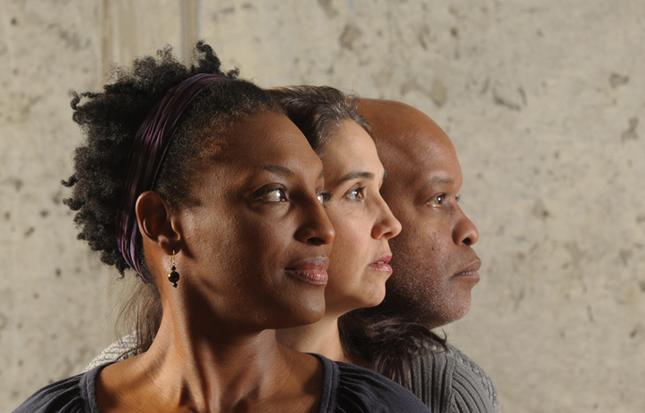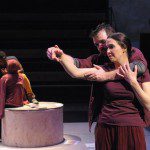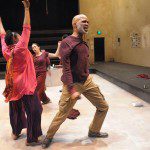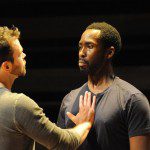‘We Are Proud to Present’: Daring, Difficult, at Woolly
By • March 13, 2014 0 1381

After the young actor Andreu Honeycutt has staggered downstage and out, apparently wailing, after they’ve put away the large lynching rope, after the explosion of n-words in the last minutes of the play and the telling of horrible racist jokes, after all that and the two hours preceding all that, there’s an awkward silence that descends over the audience at “We are Proud to Present…” at the Woolly Mammoth Theatre.
The audience, squared off across the stage in different sections, eventually claps, but the six actors in the play do not return for a bow. In some ways it seems awkward to clap, like cheering at a funeral or the site of a bloody traffic accident. Nobody’s helping us out. So, we wander out kind of dutifully, and there are the actors, handing out programs and smiling expectantly.
Even for Woolly Mammoth Theatre, with its long history and reputation of presenting new, edgy theater nobody else does, in ways that are driven by daring, sometimes discomfiting, staging, “We Are Proud to Present…” is unusual, like a daring and beautiful woman going out for a date dressed as a menacing clown.
This isn’t really a play in the usual sense. Worked out in detailed, rehearsed ways, it nevertheless resembles a provocation, an improvisation, a little like a street performance with lots of grounded details, not to mention the tail end of a day. And, in what amounts to a recent trend with Woolly productions, its immersive, inside-and-out activities surround the performance — chores to do if you choose — along with information provided to excite debate and talk. Add in the re-arrangement of the furniture of the theater, so to speak. Also, there are echoes and contexts from other plays, books, history to chew on and a zig-zag course from out-and-out-laughter to discomfiture to silence that you can actually hear.
We should afford you the full title, which may or may not spark recognition from audience members: “We Are Proud to Present a Presentation About the Herero of Namibia, formerly Known as Southwest Africa, From The German Sudwestafrika, Between the Years 1884-1915.”
The play—actually a play within a play—is about six actors trying to put together a play about Kaiser Wilhelm-era imperial Germany’s occupation of said Sudwestafrika (now Namibia) as a way of getting into the colonial games of great power nations, chief among them Victorian Great Britain. During the course of that occupation of an area populated by several different tribes, chief among them the Herero people, the Germans tried the usual imperial gambits of pitting tribes against each other. In the end, they took the course of attempting a mostly successful genocide of the Herero people because the Herero had resisted and fought back. Orders were given to kill the males and force women and children into the desert. When it was all over, some 100,000 Hereros had died. In 2004, 100 years later, Germany apologized for what happened.
Six actors — three black, three white; two women, four men — have gathered to create a play that deals with that history, but their only source material are letters written by German soldiers to their families, none of them referencing what happened or offering descriptions of the tribal population. They are full of Victorian romantic and sentimental cliches about hearth, home, love and children, missing the fireside and the wifely presence.
Initially, led by the director (in a spirited, decisive performance by the compelling Dawn Ursula), the cast members struggle, they are actors after all, of various degrees of commitment, all of them with enough ego to spare. This cast is made up of actors playing actors in search of a part and understanding of the material. The world they’ve entered suggests, at least, Pirandello’s mystifying “Six Characters in Search of An Author.”
The squabbling among them is initially about the roles: there’s the angry young black actor, the aforementioned Andreu Honeycutt, who has no interest in playing Germans and reading German letters, an older black man played by the commanding Michael Anthony Williams, and two white men—the arrogant one, played with odd confusion by Joe Isenberg, and the older guy, played with contained force by Peter Howard. There is also the generic white woman, who gets to have a name—Sarah—played with aplomb and sometimes quaint, silly goofiness, by Holly Twyford, who, asked to feel sad about the death of a cat, guts out a cat wail.
Much of this is initially very funny—actors after all often offer a ridiculous face to the world—but as they continue to fail to come to grips with the subject—the murder of the Hereros—racial concerns rise to the fore.
“We haven’t dealt with what happened,” says the angry young man, and he tries to get them into that area. There’s talk of appropriating suffering, appropriating roles, until prodded by their director, they come face to face with the monster in the historic woodshed.
When the young white actor has to shoot a defenseless Herero, he at first can’t do it. “I’m not like that,” he says. “I can’t do this.” But, of course, he can, and now we are in the thick of it: songs of loss and home and massive suffering. In a kind of not surprising, but nevertheless shocking, segue, we appear to be in the American south. The white actors are talking “Cracker Southern,” and the rope is raised. It becomes hard to swallow, because there is a temptation to say stop.
The play by young playwright Jackie Sibblies Drury walks into the muddy waters of comparative crime, of the unsettled cloud of race American style, not to mention the Holocaust, also perpetrated by Germany, and other genocides of all kinds. The segue into our times, or the times just preceding, is not smooth. It happens all of a sudden and here we are, and suddenly everyone gets quiet.
Does it add up that way? A question that’s raised, but only individuals can answer it. As it is, the proceedings lets you look not only at yourselves, but across the way at other members of the audience who sit silent, crossing legs, scrunched up, or a couple that hold hands strongly, after appearing to argue, the faces changing every bit of the way. It’s uncomfortable to look at people like that because surely they’re looking at you.
“We Are Proud to Present” is all of a piece in recent theatrical offerings by Woolly Mammoth—last year’s almost stately “The Convert,” which dealt with Christian missionaries in Africa, “Detroit,” which was configured somewhat similarly physically, and “Appropriate”, a wildly feverish play about buried secrets among members of a white Southern family written by an African American playwright.
However worked out this play was, and it was done with care, it had the look of stuff that happens every day to most of us: life and death, cab rides in which a driver offers up the notion that there may be such a thing as a coming apocalypse, the hurly burly of demographic change in this city.
“We are Proud to Present … “ runs at the Woolly Mammoth Theatre through March 9.
- Jordan Wright
- Dawn Ursula, Holly Twyford, Michael Anthony Williams | Stan Barouh





